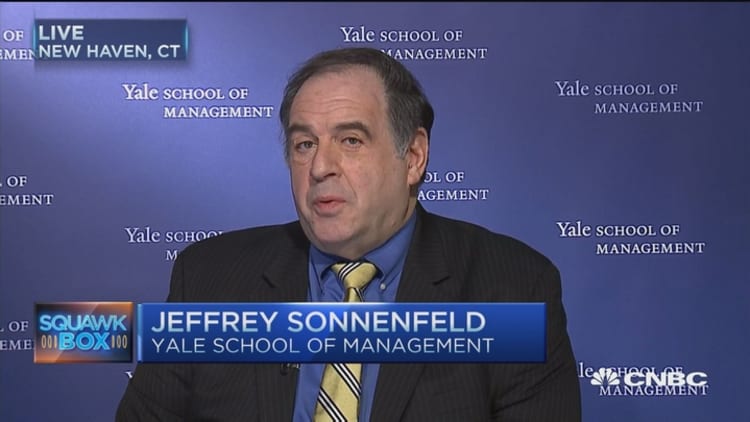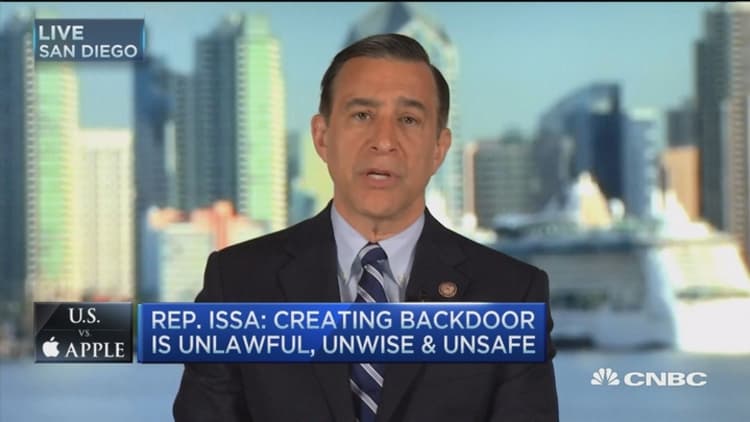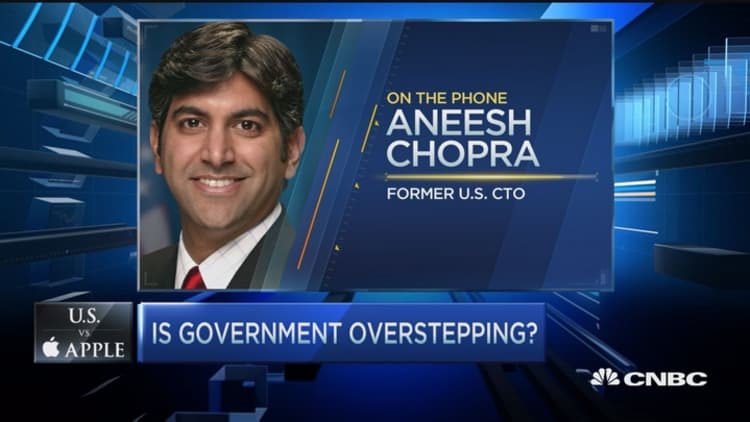


Apple is likely to reach a settlement with the Justice Department to avoid a lengthy court battle in its ongoing dispute over unlocking an iPhone used by one of the San Bernardino terrorists, a former senior counsel for the SEC's Division of Enforcement said Monday.
Jacob Frenkel, partner at Shulman Rogers, said he believes Apple must be concerned that if the case were to go to court, it could create legal precedents that would work against the company, as well as phone manufacturers and carriers in general.
"The potential for bad case law that will affect Apple more broadly and the industry more broadly ultimately is a greater concern," he told CNBC's "Squawk Box."
"I really do not believe this is going to wind its way through the courts," he said.
Frenkel said the standoff is "a public relations debacle" for Apple in some respects, and he believes the company will try to save face by saying it has found a way to protect the public and satisfy the Justice Department's request.
In a letter to Apple employees sent Monday, Apple CEO Tim Cook said he would be willing to participate in a dialogue but wanted the government to rescind its order that Apple unlock the iPhone.
"We feel the best way forward would be for the government to withdraw its demands under the All Writs Act and, as some in Congress have proposed, form a commission or other panel of experts on intelligence, technology and civil liberties to discuss the implications for law enforcement, national security, privacy and personal freedoms. Apple would gladly participate in such an effort," he wrote.
A hearing related to the Justice Department's request for Apple to unlock Syed Rizwan Farook's iPhone — which was owned by his employer — is scheduled for March 22.
In a statement released Sunday, FBI Director James Comey said "We don't want to break anyone's encryption or set a master key loose on the world."
A U.S. magistrate last week ordered Apple to provide the FBI with highly specialized software that could be loaded onto the work-issued iPhone 5C used by Farook. He died with his wife in a gunbattle with police after killing 14 people in December.
The software would help the FBI hack into the phone by bypassing a security time delay and feature that erases all data after 10 consecutive unsuccessful attempts to guess the passcode. This would allow the FBI to use technology to rapidly and repeatedly test numbers in what's known as a brute force attack.
The Justice Department filed a motion Friday to compel Apple to assist investigators in accessing the data.
In a statement last week, Cook said the "U.S. government has asked us for something we simply do not have, and something we consider too dangerous to create." Once the software has been created, it would allow anyone who acquires it to potentially unlock any iPhone in his or her physical possession, he warned.
Frenkel said the Justice Department's motion lays out detailed steps to preserve and protect general public privacy.
Jeff Sonnenfeld, senior associate dean of the Yale School of Management, said Cook is right to take the position he has taken, but only up to a point.
"If he were to knuckle under too easily, of course the integrity of the Apple products, everything they've built in terms of the privacy is up for question," he told "Squawk Box" on Monday.
However, he said Apple has responsibilities, and the San Bernardino County Department of Public Health should have the final say on whether the phone is unlocked because it owns the device.
The department has supported federal investigators' requests to search the device.
Shane McGee, chief privacy officer at network security firm FireEye, said the government shouldn't rely on technology companies to hack their own systems. Instead, federal authorities should invest in human intelligence, advanced forensic techniques, and partnerships with tech firms, he said.
There is a compromise to be made, but the participants need to reduce their posturing and rhetoric, and the government must not use nuclear options, he said.
Apple "should have to respond to warrants and subpoenas. This is not a warrant. This is not a subpoena," he told "Squawk Box" on Monday. "This is an unprecedented court order that makes them go and rewrite their own operating system and remove the protections that they had in that operating system."



Should Apple comply, the government must spell out exactly when the company can be compelled to unlock iPhones to reduce the risk of the technology falling into the wrong hands and being abused by authorities, said James Jeffrey, former deputy national security adviser under President George W. Bush.
"This has to be very, very narrowly defined, or otherwise law enforcement will have a field day, running around, tapping into everybody's iPhones and other devices. There is no doubt that that will be the danger," he told "Squawk on the Street" on Monday.
Rep. Darrell Issa, a Republican member of the House Judiciary Committee who opposes the government's order, said Monday there is no doubt Apple would be forced to unlock iPhones repeatedly once a precedent is set.
That could in turn lead to a situation in which the government can order virtually anyone to develop technology for the benefit of authorities, he added.
"When Apple develops something to give confidence to its owners that in fact they have a level of security, to make them undo it would be slippery slope," he told CNBC's "Squawk Alley."
— CNBC's Jacob Pramuk and Christine Wang and The Associated Press contributed to this article.




